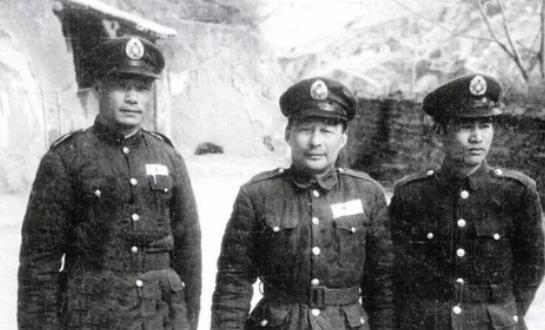During the Liberation War, Hu Zongnan led hundreds of thousands of troops to fight in the northwest and Yiye, and although the strength and firepower were absolutely superior, they ended in a fiasco. The reason for this result, in addition to Hu Zongnan's command level is far inferior to Peng Zongzong's, is that there are too few generals under him who can fight. Dong Zhao, Liu Jie, Liao Ang, Liu Ziqi, He Wending, and Chen Wu were all very limited in their abilities, and their command level was even inferior to that of Hu Zongnan.

But there was one person who was an exception, he was Zhong Song, who was the commander of the reorganized 36th Division at the time, and among the many generals under Hu Zongnan, Zhong Song was the only one who could cause trouble for General Peng. However, due to various reasons, his popularity is not high, today we will talk about this low-key but quite powerful fierce man. Zhong Song is a native of Songyang, Zhejiang Province, and after graduating from normal school, he returned to his hometown as a primary school teacher for two years. In 1924, the Whampoa Military Academy began to enroll, Zhong Song decided to abandon Wen Congwu, he went south to Guangzhou, was admitted to the Huangpu Phase I, and became classmates with Hu Zongnan, Du Yuming and others.
Soon after the opening of the military academy, Zhong Song was infected with typhoid fever, and he did not know whether the school doctor was careless or limited in level, and even misdiagnosed him as a terminal illness. Thanks to the timely discovery of fellow villager Zhang Shuqing, he got him out of the morgue and asked someone to treat him. Zhong Song recuperated for more than half a year before he fully recovered, but at this time, Huangpu Phase I had graduated, and he could only enter the second phase to continue his studies. After graduating from the military academy, Zhong Song first participated in the Jiang-Gui War and the Central Plains War, and then participated in the War of Resistance Against Japan, and performed well in the Battle of Songhu, the Battle of Wuhan and the Battle of Zhongtiao Mountain, and won a Medal of Blue Sky and White Sun for his military merits.
Although he fought bravely and made outstanding achievements, Zhong Song's career was not smooth, and when the War of Resistance was won, he was only a deputy commander under Wang Lingyun, and he was ostracized by Wang Lingyun everywhere, and his situation was extremely embarrassing. And his compatriot Hu Zongnan was already the commander of the First Theater with more than 400,000 troops. Soon after the outbreak of the Liberation War, Hu Zongnan found that although he had hundreds of thousands of troops, there were too few generals under him who could fight, and at this time he remembered his brother who was particularly capable of fighting, so he transferred Zhong Song to his side as the commander of the reorganized 36th Division.
After Zhong Song arrived in the northwest battlefield, he quickly became the number one general and "firefighting captain" under Hu Zongnan with his outstanding performance. In July 1947, Peng commanded two columns of troops to encircle Yulin. Deng Baoshan hurriedly asked Hu Zongnan for help, but the generals under Hu Zongnan were afraid of the plan to attack the encirclement point of our army, and no one refused to lead the troops to relieve Deng Baoshan, and finally Hu Zongnan gave this task to Zhong Song.
In order to avoid the ambush of our army, Zhong Song chose an unexpected marching route, he did not go on the road, after leaving the Great Wall directly into the desert, after 2 days of arduous marching suddenly appeared under Yulin City. In this way, the reinforcements carefully arranged by General Peng were left behind by Zhong Song, and our siege troops were still facing the danger of the enemy's internal and external attacks. Peng Zong saw that the situation on the battlefield was unfavorable and resolutely ordered a retreat.
After this battle, Peng Zong aimed his combat target at Zhong Song and repeatedly planned to ambush him. However, Zhong Song's sense of smell on the battlefield was extremely sensitive, and the march was very cautious, so our army could not find the opportunity. It was not until the outbreak of the Battle of Shajiadian that our army surrounded Zhong Song, but Zhong Song was very brave, led his troops to counterattack many times, and forced a bloody road out of the encirclement circle of our army and broke through. Being able to successfully escape from Peng Zong's encirclement, Zhong Song was still the first.
In late April 1948, our army launched the Battle of Xifu, which resulted in first victory and then defeat, and this clock Matsuichi changed his previous cautious style and advanced at a high speed of 100 miles a day, causing great losses to Ichino's rear guard troops. Being able to attack and defend, and also good at grasping fighters, Zhong Song became the most important opponent of Ichino. After the battle of Feng Yuan, Zhong Song was extremely dissatisfied with Hu Zongnan's blind command, and he fought with him in public, and Hu Zongnan dismissed Zhong Song in a fit of rage. No one expected that Ichino's most difficult opponent, Zhong Song, would leave the front line in such a dramatic way, and in 1995, Zhong Song died of illness in the Netherlands at the age of 95.